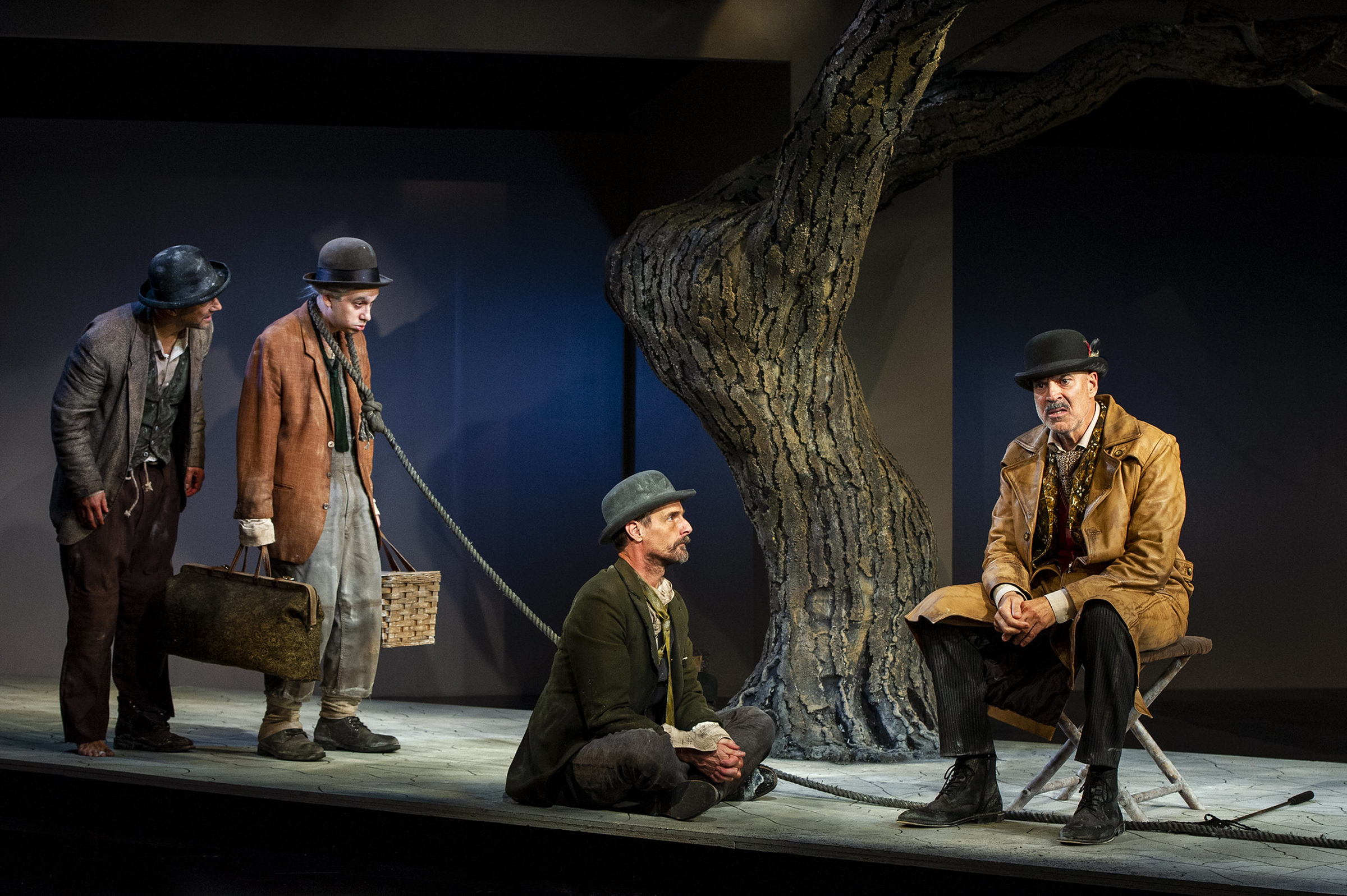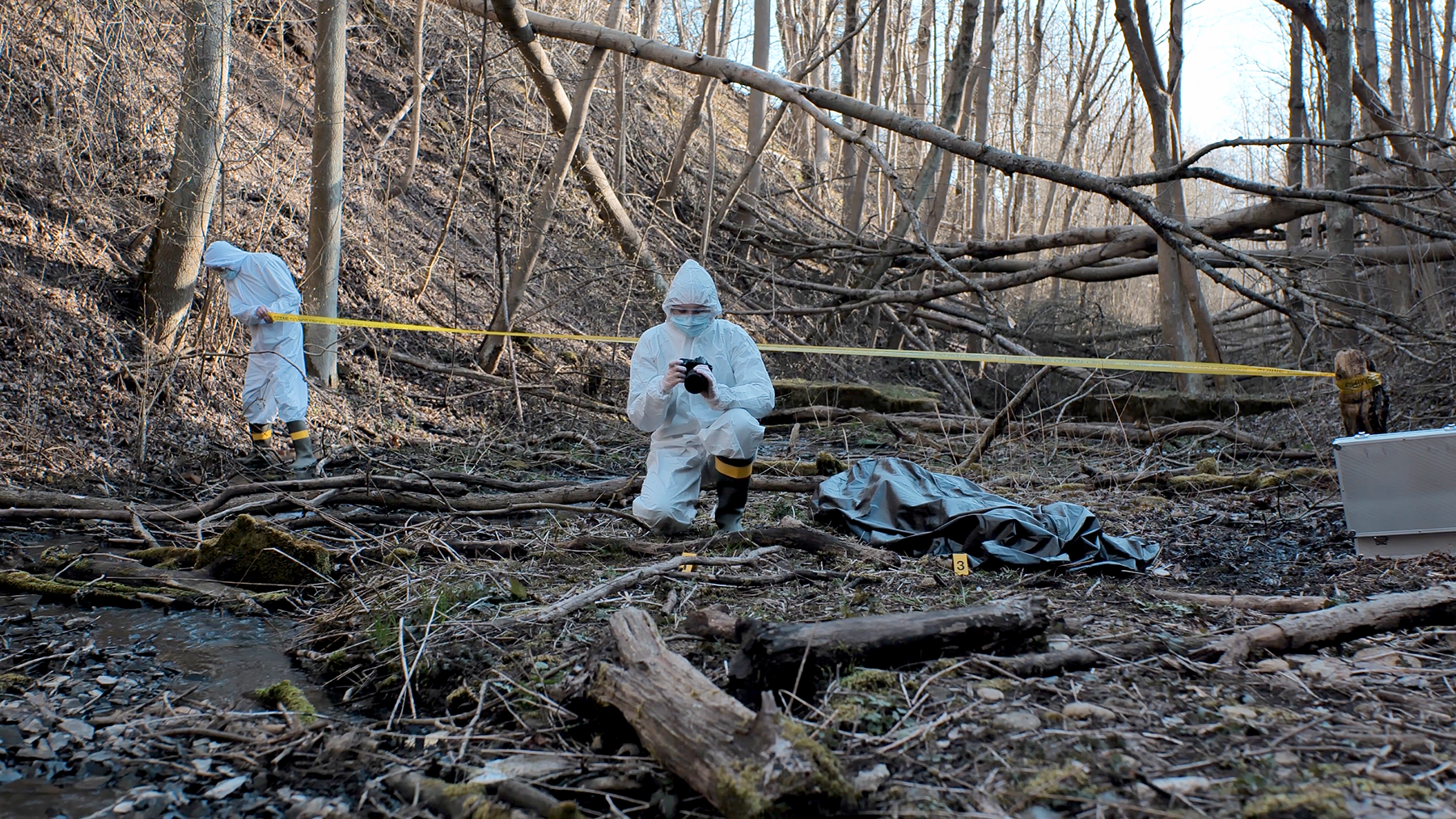If you go, to take in Godot, leave your guarded cynicism, your self-conscious entitled guilt, your anxiety that maybe you don’t have the right to laugh, all of it, leave it at home in a basket by the door. All these barbed wire, mahogany, nylon, cast iron, leather emotional restraints will not serve you. They will weigh down your spirit as heavily as suitcases filled with sand.
NTRVW: BSC Artistic Director Julianne Boyd
Barrington Stage Company’s production of Samuel Beckett’s Waiting for Godot runs for one more weekend, a fact that puts the tragic in tragicomedy. This work out of the Theatre of the Absurd camp can be so easily fucked up, so easily underdone, or overdone, or delicately done, or aggressively done. But Joe Calarco, a BSC veteran, directs this existentialist exploration with just the right touch in nearly every regard.
Godot is no story in any traditional sense, as there is neither beginning nor end. Neither character growth nor conflict resolution. Two men meet up near a tree at the side of the road in some unspecified remote location. They have been instructed to report there at a specified time, whereupon they will keep an appointment with the mysterious Godot. The hours pass. The days pass. The weeks may even pass Given that the expression “waiting for Godot” has long been in the language as shorthand for a frustrating wait for something that will never come (but that one is somehow duty-bound to attend anyway), it would be no spoiler to announce that theatre goers should not expect a big Hollywood finish (but wouldn’t THAT be a sequel?!).
The men, Vladimir and Estragon (played by Mark H. Dold and Kevin Isola, repectively) know each other well enough to have formed a sort of co-dependency which manifests in bickering, hi-speed witty banter, or moments of accidental profundity. Yet each seems to possess the capacity either for short or long-term memory as they gaze out from their open air purgatory searching for any sign of Godot, or gaze inward for any sign of who they themselves are. Gogo (Vladimir’s pet name for Estragon) manages to get the shit kicked out of him every night by unidentified thugs, and every morning, Didi (Estragon’s pet name for Vladimir) offers sympathy, but never an explanation as to where he was when the assaults occur.
Presenting the outward appearance of tramps, Didi and Gogo cycle through a double album of Philosophy’s Greatest Hits in the stuffed-to-capacity two and a half hour show. Beckett’s love of Vaudville and films starring Charlie Chaplin, Laurel and Hardy, and Buster Keaton shines across the decades and through the performances of Dold and Isolda brilliantly. Not knowing of Beckett’s penchant for physical comedy, an audience member might find the buffoonery heavy handed. I wonder how much effort Calarco had to employ just to reign in the (exquisitely timed) slapstick of the two prinicpals of the play.
The longer the show goes on however, the more desperation begins to creep into verbal volleys, the more synthetically cloying seem Gogo’s and Didi’s pleasantries. The animated chimpmunks Chip and Dale turned maudlin, yet climbing the walls. They begin to prompt each other to come up with the next thing to do or say with logarithmic acceleration. It becomes clear that each exchage is a Janusian auditory illusion — is the face laughing? Or is it crying? The more quickly a hearty laugh comes after a bit, the more swiftly one can find oneself at the bottom of a tiger trap of despair. That dualism, of course, is a testament to Beckett’s genius, but equally to Calarco’s ability to steer a deliberately sinking ship of a tale and the talents of Dold and Isolda, whose Gogo is the perfect long-suffering straight-man. Dold’s Didi has, perhaps, the heavier lift, and he imbues the role with a vulnerability and innocence that are beauftiful to behold, and delivered with a deceptively sonorous voice finds the right tone for every swiftly shifting mood of the play.
Pozzo, a rich pomposity of a tyrant played by longtime BSC member Christopher Innvar bisects Didi’s and Gogo’s anxious blather by parading through their meeting place by the tree dragging along a leashed slave, Lucky (or Pig, as Pozzo insists on calling him, played by Max Wolkowitz). Pozzo claims to own the land through with the road travels, though no proof of this is ever produced. He seems, at first, to represent a tangible, modernist island in a sea of subjectivism. If the rapidly accumulating pile of the two tramp’s unanswered questions creates a frantic neurosis, Pozzo’s bluster molests the audience with it’s absurd self-assured blindness to the madness that had descended upon the world. Scholars have debated whether the setting of Godot is apocalyptic in some spiritual sense or a wasteland of a much more temporal nature. Innvar chooses to give his Pozzo a nearly unwavering level of high intensity bombast, which works about 95 percent of the time. At certain moments, I found myself waiting for Innvar to tone it down a bit to match the tenor of one segment of a scene or another. On the other hand, Pozzo has to be almost impossibly huge and explosive one moment, and then almost meditative the next, and I do not envy any actor asked to become a human rubber band for such a long, long time.
Wolkowitz, as Lucky, the hapless slave, does physical comedy as well as just about anyone you’ve ever seen. Having no lines for most of his time on stage, all the action is happening in the expressions on his face and in the posture and gestures he’s allowed. As he labors to carry, past the point of exhaustion, someone else’s baggage weighing the weight of the world (perhaps Beckett’s most accessible metaphors). Except, of course, for one brief elucidation that will make you wish, wish, wish, wish you could hit “rewind” over and over and keep watching it in amazement again and again.
This work has been picked apart by 300-level college classes, and my own grasp of all the meaning the Beckett packed into 50 single-spaced pages is far, far from complete, so don’t expect any more interpretation from me. Just know that the themes you’ll encounter seem as easily custom-written for the early 21st Century as they do for the mid-20th. And Barrington Stage Company’s production dials in with precision on the precarious fragility of our shared humanity and the outrageous gall that we humans have to keep holding on to hope, when all that we have to base it on is yet another sketchy assurance that if we just show up tomorrow by the tree, all will be explained. All will be made right.









